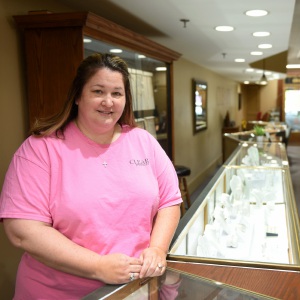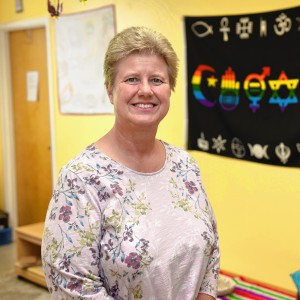Inspiring culinary adventures: Orange resident helps make home cooking more delicious
| Published: 04-18-2023 9:03 AM |
Nalini Goordial’s life has taken her to many places and different kinds of work, yet one lifelong constant is a passion for food. Through Kitchen Wizardry, the Orange resident now offers resources for those wishing to make nutritious home cooking easier and more fun.
Goordial grew up in Guyana, a country on South America’s North Atlantic Coast in a community of Indian immigrants, and learned to cook skillfully at age ten. Her grandparents left their native India as young adults and worked as indentured servants on Guyanese sugar cane plantations, and subsequent generations of family members retained important rituals related to food.
A couple of years ago, Goordial started a recipe blog which then turned into a business. Kitchen Wizardry inspires home cooks while encouraging those living in food deserts — places with limited access to fresh foods, as well as a lack of diversity — to literally spice things up.
In addition to marketing specially blended international spices, Goordial offers food demos. “Cooking needn’t be mysterious,” she said. “I can help people get dinner on the table within half an hour, and spices are an easy, low-calorie way to add flavor.”
Goordial formerly ran the kitchen at Quabbin Harvest, Orange’s food co-op. “I didn’t want to make sandwiches,” she said. “I wanted to do what I know best: international foods.”
She’s masterful in many genres, including southwestern (U.S.), Indian, Middle Eastern, Asian, and South American. “Quabbin Harvest became a popular lunch stop,” said Goordial, “and it continues even though I’ve moved on, although the name changed from Nalini’s Kitchen to Kitchen Collaborative.”
Deb Habib, who co-founded Seeds of Solidarity and the Garlic & Arts Festival, invited Goordial to do a spice demo at the 2022 festival. “I love doing events based on community education and food,” said Goordial. “That’s really how Kitchen Wizardry started.”
Her website offers informative nuggets. For example, “tisane” can mean different things. The word may bring to mind herbal tea, yet Goordial emphasizes that a tisane is any drink made from the infusion or decoction of dried or fresh leaves, flowers, seeds, fruits, roots, or even vegetables. “In India, tisanes are medicine,” said Goordial, who also studied herbology and offers kits for those interested in Ayurvedic teas.
Article continues after...
Yesterday's Most Read Articles
 New owners look to build on Thomas Memorial Golf & Country Club’s strengths
New owners look to build on Thomas Memorial Golf & Country Club’s strengths
 Orange man gets 12 to 14 years for child rape
Orange man gets 12 to 14 years for child rape
 Greenfield Police Logs: April 2 to April 8, 2024
Greenfield Police Logs: April 2 to April 8, 2024
 One Greenfield home invasion defendant up for bail, other three held
One Greenfield home invasion defendant up for bail, other three held
 Fire scorches garage on Homestead Avenue in Greenfield
Fire scorches garage on Homestead Avenue in Greenfield
 Cleary Jewelers plans to retain shop at former Wilson’s building until 2029
Cleary Jewelers plans to retain shop at former Wilson’s building until 2029
Goordial enjoys helping people restore or maintain health. “Guyana was a place of turmoil as I grew up,” she said. “Scarcity was rampant due to poverty and government control. When I moved to America, I found, in some cases, the other extreme: overabundance.” Embracing extremes teaches Goordial valuable lessons, which she parlays into culinary interests: “I’ve always cooked, studied, and researched food and healing.”
Kitchen Wizardry products are created in small batches from high quality, carefully sourced organic ingredients. “My mission is to give others a taste of what goes on in my kitchen, in my world,” said Goordial. “As I grew up in a third world country, everything was done by hand. We had no pre-packaged food; we’d just go into the garden. My auntie taught me to make bread, roti, curries, all sorts of Indian food.”
The history of Indian food in British colonies — as Guyana was until 1966 — is long and complex. Goordial noted that people were sent from India to Guyana as indentured servants, having been told, falsely, that they could receive passage back to India after five years, or be granted a piece of land in Guyana. “Initially, the British used enslaved people from Africa to do sugar cane plantation work,” said Goordial, “but when slavery was abolished, they tried using Chinese and Portuguese immigrants.” Yet the Brits deemed those immigrants unsuitable for field work and drew instead on people from British-occupied India.
Indian indentured servants were routinely maltreated. Goordial has examined papers in a British museum showing letters from British plantation owners in Guyana asking for help from those occupying India. “They were told their needs could be easily accommodated,” said Goordial, who reviewed correspondence preserved in the museum: “Plantation owners were told, ‘We can send you X number of Indian workers. Their needs are few, because they’re basically like monkeys.’ That’s how my ancestors were regarded.”
The British developed an avid taste for so-called curry, “but curry is not a thing in India,” said Goordial. “There’s an Indian cooking vessel called a karahi, which is where the British got the word.” She added, “Now you find ‘curry’ everywhere the British went, because indentured servants wanted familiar foods from home.” Yet she emphasized that immigrants had to substitute ingredients, so Caribbean blends are different from those of India.
“If you go to India and ask for curry powder, it’s literally not a thing,” said Goordial. “They’re all mixes.” Goordial specializes in Carib-influenced Indian food, among many other types. “There are similarities [between India- and Carib-based versions], but you can taste the difference.”
Roti — a round flatbread — is the same wherever you go, said Goordial. It’s popular in India, Sri Lanka, Pakistan, Nepal, Bangladesh, Myanmar, Malaysia, Indonesia, Thailand, Suriname, Jamaica, Trinidad, and Tobago, Fiji, and many other places.
“Even within India, there’s a huge amount of variation,” said Goordial. “My family’s originally from northern India, much of which is now Pakistan. There, it’s common to find roti, paratha, chapati, and naan, while in the south, dosa is more prevalent,” she added, referring to various bready products. “It all depends on how it’s cooked.”
Leaving her Guyanese-Indian community and emigrating to the U.S. at age 18 imbued Goordial with rich backgrounds, and she continues to add fascinating permutations to her life. She worked in corporate sectors, but “burned out, leading to significant shifts.” Following the dissolution of her first marriage, Goordial remarried. She and her husband wanted to live off the grid and acquired 10 acres in New Mexico.
“We lived in a passive-solar yurt, and had the time of our lives in the middle of the desert, with photovoltaics and a windmill. We hauled water in 300-gallon tanks.” Their closest neighbor was 10 miles away, and the couple “tried to keep our footprint as small as possible, and to figure out how we were going to continue living like that as we aged.” The question was answered, however, when Goordial’s mother-in-law fell ill; the couple moved to Colorado to care for her.
Living off the grid was familiar to Goordial, who grew up cooking with wood over open fires. “It was hard to leave New Mexico,” she said, “but by that time, my kids had kids, and I wanted to spend more time in Massachusetts. My husband and I found a piece of property in Orange and spent years working on the place. Initially, we spent summers here, but I’ve been here year-round for about 10 years.”
No matter where Goordial is, or wherever her fans reside, her wizardry enlivens kitchens far and wide, inspiring people to go on culinary adventures. To visit Kitchen Wizardry: kitchenwizardry.me.
Eveline MacDougall is the author of “Fiery Hope” and an artist, musician, teacher and mom. She loves to hear from readers: evelinemacdougall@gmail.com.

 Speaking of Nature: Indulging in eye candy: Finally, after such a long wait, it’s beginning to look like spring is here
Speaking of Nature: Indulging in eye candy: Finally, after such a long wait, it’s beginning to look like spring is here Celebrating ‘Seasonings’: New book by veteran preacher and poet, Allen ‘Mick’ Comstock
Celebrating ‘Seasonings’: New book by veteran preacher and poet, Allen ‘Mick’ Comstock Faith Matters: How to still the muddy waters of overthinking: Clarity, peace and God can be found in the quiet spaces
Faith Matters: How to still the muddy waters of overthinking: Clarity, peace and God can be found in the quiet spaces A time for every purpose under heaven: Free sing-a-long Pete Seeger Fest returns to Ashfield, April 6
A time for every purpose under heaven: Free sing-a-long Pete Seeger Fest returns to Ashfield, April 6
